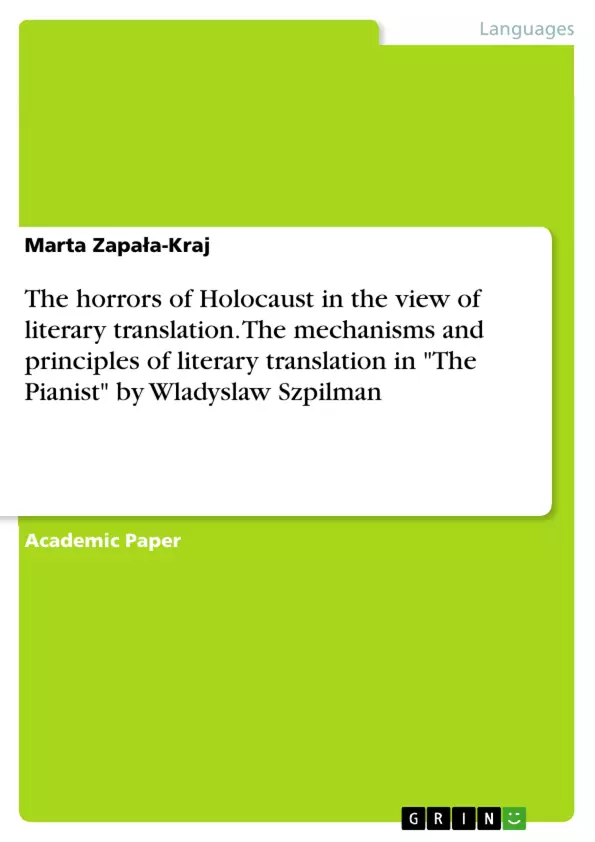The primary aim of this thesis is to present the art of literary translation through the perspective of a book. This book was written by the musician Władysław Szpilman and depicts his life. Szpilman is a survivor of the Warsaw Ghetto, which is the period in Polish history that was shadowed by the horrors of mass murders both on Polish and Jewish nations.
Translation gives us access to the literature of the world. It allows us to enter the minds of people from other places. And it enriches not only our personal knowledge and artistic sense, but also our culture’s literature, language, and thought. Still, literary translation is an odd art. It consists of a person sitting at a desk, writing literature that is not his or her own but has someone else’s name on it. Like a musician, a literary translator takes someone else’s composition and performs it in his own special way. Just as a musician embodies someone else’s notes by moving his body or throat, a translator embodies someone else’s thoughts and images by writing in another language.
Inhaltsverzeichnis (Table of Contents)
- Introduction
- Chapter One: Persecution of the Jewish nationality and the ghetto presented in The Pianist by Władysław Szpilman
- Chapter Two: Mechanisms of Literary Translation
- Chapter Three: Analysis of translation methods of Władysław Szpilman's Pianist
- Conclusion
Zielsetzung und Themenschwerpunkte (Objectives and Key Themes)
The primary objective of this thesis is to explore the art of literary translation through the lens of Władysław Szpilman's "The Pianist," a book that recounts the author's experiences as a Jewish musician during the Warsaw Ghetto and the Holocaust. The thesis aims to demonstrate the complexities and challenges of translating a work with such profound historical and personal significance.
- The Holocaust and its impact on Jewish life in Poland
- The process and complexities of literary translation
- The translation techniques and methods used in translating "The Pianist" into English
- The role of the translator in preserving the author's voice and intention
- The significance of literary translation in fostering cultural understanding and preserving historical memory
Zusammenfassung der Kapitel (Chapter Summaries)
- Chapter One: Persecution of the Jewish nationality and the ghetto presented in The Pianist by Władysław Szpilman: This chapter delves into the historical context of the Holocaust in Poland, focusing on the experiences of Jewish individuals, particularly the protagonist, Władysław Szpilman, as depicted in his memoir "The Pianist." It examines the persecution faced by the Jewish community, the establishment of the Warsaw Ghetto, and the brutality inflicted upon its inhabitants. The chapter explores the impact of these events on Szpilman's life and his survival amidst a climate of terror and uncertainty.
- Chapter Two: Mechanisms of Literary Translation: This chapter provides an overview of the theoretical framework of literary translation. It discusses various aspects of translation, including the role of the translator, the challenges of rendering meaning across languages, and the different translation strategies employed. The chapter examines the importance of conveying not only the literal meaning but also the nuances, cultural references, and stylistic elements of the original text.
- Chapter Three: Analysis of translation methods of Władysław Szpilman's Pianist: This chapter analyzes the translation methods used in the English translation of "The Pianist." It focuses on the translator's choices in rendering the original text, considering the specific challenges posed by the narrative's historical and emotional weight, as well as the cultural context of the original and translated works. The chapter assesses the effectiveness of the translation in preserving the author's voice, the authenticity of the historical context, and the emotional impact of the narrative.
Schlüsselwörter (Keywords)
The primary keywords and focus topics of this thesis include: Holocaust, literary translation, translation studies, Władysław Szpilman, "The Pianist," Warsaw Ghetto, Jewish persecution, cultural memory, historical context, translation methods, translation techniques, authorial voice, cultural understanding, and the challenges of translating historical narratives.
- Quote paper
- Marta Zapała-Kraj (Author), 2018, The horrors of Holocaust in the view of literary translation. The mechanisms and principles of literary translation in "The Pianist" by Wladyslaw Szpilman, Munich, GRIN Verlag, https://www.grin.com/document/470996



